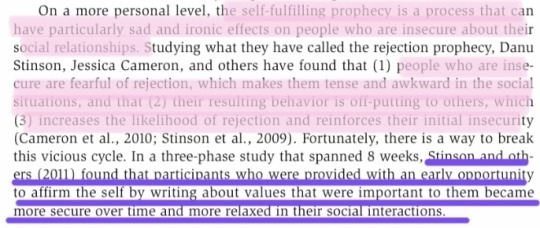#social psychology
Text
If a person loves only one other person and is indifferent to the rest of his fellow men, his love is not love but a symbiotic attachment, or an enlarged egotism. Yet, most people believe that love is constituted by the object, not by the faculty. In fact, they even believe that it is a proof of the intensity of their love when they do not love anybody except the "loved" person. [...] Because one does not see that love is an activity, a power of the soul, one believes that all that is necessary to find is the right object — and that everything goes by itself afterward. This attitude can be compared to that of a man who wants to paint but who, instead of learning the art, claims that he has just to wait for the right object, and that he will paint beautifully when he finds it. If I truly love one person I love all persons, I love the world, I love life. If I can say to somebody else, "I love you," I must be able to say, "I love in you everybody, I love through you the world, I love in you also myself."
/ Erich Fromm, The Art of Loving
#quotes#erich fromm#love#books#books and reading#relationship#psychology#social psychology#philosophy#texts
23 notes
·
View notes
Text
the self-concept

hellour! this is gonna be a long post!
.・。.・゜✭・.・✫・゜・。.
i was studying for my social psychology course today (for context i'm a psych major) and read something that might be helpful for everyone who's been having doubts about manifestation subconsciously being part of our everyday lives—as opposed to something made up by the internet.
the information i'm about to provide is from actual sociologists and psychologists, so this is rooted in studies. i promise i'm not about to pull info out of my ass! this is mainly just a very very brief summary of the self concept chapter we're reading about in class.
side note, i named all the researchers in case you wanna check out their work yourself! i made this post to provide insight about our self-concept and clear limiting beliefs. :)
what is self-concept?
so we hear the term self-concept a lot in the manifestation community. Neville, Edward, Sammy, Dr Joe Dispenza, bloggers on tumblr… all of them talk about it all the time. but what does it actually mean?
the self-concept refers to the total sum of beliefs that people have about themselves. it consists of cognitive molecules that social psychologist Hazel Markus called self-schemas. these are the beliefs about ourselves that guide the processing of self relevant information. but what does this actually mean?
well, self-schemas are to the self-concept what books are to a library. if someone asks about yourself, you will probably answer with something quick like: “i am a woman” or “i am a student.” those simple attributes are part of your self-schema; if we want to go deeper, body weight is also a self-schema. for people who regard weight as a crucial part of their beliefs, something simple like a gym trip with friends or buying stuff at the supermarket may trigger thoughts about the self. but if a person is aschematic (not concerned by a certain attribute) about body weight, no thoughts will pop up.
we already know that the self is a special object of our attention. whether its a thought or a song, our consciousness is like a spotlight. this means that it can shine on one object at one point in time, yet shift rapidly from one object to another and process information outside of awareness. in this spotlight, the self is at the forefront of our minds. its what's most important to us at that moment. keep this in mind for later!
to finish with the explanations, neurologist Oliver Sacks highlighted two important points about the self:
🩷 there is a private “inner” self, and an “outer” self we show to others. if we don’t self reflect to understand how were feeling, how will we understand our emotions and actions?
🩷 the self is heavily influenced by social factors.
now–what does that last point mean? well, what we think about ourselves is rooted from childhood. if we grow up hearing “you’ll never amount to anything” or “you’re my favorite child” (extreme examples i know), then that's what we’ll ingrain in our self-concept. this notion brings me to the fun stuff–the studies!
is self-concept scientifically proven?
psychologist Gordon Gallup performed a series of studies where he put animals in front of a mirror to test if they could recognize themselves. at first, they vocalized and greeted themselves in the mirror (my dog did this too when he was a pup, he would bark at his own reflection and play with it), but after several days, only great apes seemed capable of self recognition, using the mirror just like any other human would. grooming themselves, making faces… in short, they recognized themselves!
why do i bring this experiment up? well, this proves that the concept of “me” is necessary to define our self-concept. we must first recognize ourselves as Something to become Someone.
using that same study in humans, this process of self-recognition begins between 18-24 months. which means that from this point onwards we start to define Self (consciousness).
you might read this and–admittedly–think: “oh this blog post hasn’t said anything about manifestation!” true, but i want to present the basics or self-concept first to understand how it affects our daily thoughts!
there was another experiment we talked about in one of my lectures (i do not remember who performed this study specifically, but Dr Patrick Heck did one similar to this one and the results were the same), where participants were told to take a test. half of them were told to boast about themselves, and the rest were instructed to describe themselves modestly. naturally, participants who spoke highly of themselves scored higher on these tests than participants who didn’t. so… you all see where i’m going with this.
remember how i said to keep the “consciousness is a spotlight” paragraph in mind? i’ll finally touch on it with this next and last thing i’m gonna talk about (in this post at least!).
we already established that the first step in the evolution of our self-concept is the ability to recognize ourselves as Someone. the second step, however, involves social factors. sociologist Charles Horton Cooley introduced the term looking-glass self to suggest that other people serve as a mirror in which we see ourselves. and another sociologist by the name of George Herbert added that the only way to know ourselves is by imagining the opinions of our significant others and applying them to our self-concepts. sounds familiar?
how do i change my self-concept?
Neville mentioned the “mirror-self” on his conferences too. he said that one of his favorite techniques to better his Self was to imagine a loved one speaking kindly of himself. in his book Your Faith is Your Fortune, Neville wrote: “Stop trying to change the world since it is only the mirror. Man’s attempt to change the world by force is as fruitless as breaking a mirror in the hope of changing his face. Leave the mirror and change your face. Leave the world alone and change your conceptions of yourself. The reflection then will be satisfactory.”
since the self-concept is a library (our perception of Self) made out of self-schemas (books brought to us by our peers), we can see that sometimes, what we think of ourselves is just an amalgamation of beliefs implanted to us by the people in our lives. so if we were given these books we don’t like, why should we keep them in our library?
to change these negative beliefs we have about ourselves, all we have to do is replace them with positive ones. i know, i know, this is what every person who studies loa and manifestation regurgitates over and over. its nothing that hasn’t been posted to numerous blogs or twitter threads before.
however, the point about this whole post is to tell you why that is the only way to change your self-concept. if your daily thoughts are filled with phrases like: “my sp doesn’t want me” and “i’m so broke” or “what’s the point? this is all worthless anyways.” STOP. DROP. CHANGE.
journal. write your limiting beliefs in your ipad, paper, wood, stone–whatever.
use your hands to apply muscle memory. once you have them, CROSS THEM OUT!
i can’t manifest = I CAN MANIFEST EVERYTHING I WANT
i hope i shift tonight = I KNOW I SHIFT EVERY NIGHT
i wish i had money = I HAVE ALL THE MONEY I WANT AND MORE
just those small changes are enough to rewire your entire self-concept. also, exposure. the more exposure you have to something, the more insecure it will make you. if you’re having a hard time manifesting, remove all blogs, twitter accounts, and people that limit your beliefs. less exposure to negativity = less negativity reflected in your self-concept.
problems with the Self will always be there. if you remove a negative belief, another will pop up. all you can do is learn more about your “inner” self and recognize how you’re feeling. what you can do is focus on the positives, and automatically, your self-concept will change.
persist in the assumption until it becomes your reality!


.・。.・゜✭・.・✫・゜・。.
thank you all for making it this far! just in case, the book i got this information from is Social Psychology 11th Edition authored by Kassin, Fein and, H.R. Markus. there’s a lot of interesting information on this academic book that is similar to the ones Dr Joe Dispenza has written, so i could make another post like this in the future! take care!
#loa tumblr#law of assumption#loassumption#self concept#informative#social psychology#neville goddard#reality shifting#psychology#shiftblr#reya singh#shifting#edward art#quantum jumping#void state#research
250 notes
·
View notes
Text

"Loyalty is often touted as a moral principle, or virtue, worth exemplifying in social and business relations. But is it always beneficial to be loyal? We investigate possible negative consequences of being a loyal employee in the workplace. Instead of protecting or rewarding them, loyal employees are selectively and ironically targeted by managers for exploitative practices (Studies 1–2). The targeting of these loyal workers is mediated by the assumption that loyal individuals are readily willing to make personal sacrifices for the objects of their loyalty (Study 1). We then find evidence for the reverse causal pathway: workers who agree (versus refuse) to be exploited in the workplace acquire stronger reputations for loyalty (Studies 3 and 4). These bidirectional causal links between loyalty and exploitation have the potential to create a vicious circle of suffering. We discuss the implications of these results for obtaining a reputation for loyalty."
949 notes
·
View notes
Text
#buddhism#amanda elise lee#exposed faggot#yotsuba#bts jin#golden retriever#nikon#danny worsnop#ghostface#love poem#social psychology#america
122 notes
·
View notes
Text
the self-fulfilling prophecy and the power of the spoken word

hellour again! i’m free these days, so i’d thought i’d make another long post; this time about the self-fulfilling prophecy and how Florence Scovel Shinn writes about a similar concept in her book The Game of Life and How to Play it. specifically, in the third chapter.
i really like Scovel Shinn’s works, especially because she was one of the pioneers of the New Thought school at the time, even before Neville. it’s clear that she was a very wise metaphysical author, and more people should give her some credit!
i love my major, and i love manifestation. so any chance i have to correlate both is one i will take!

remember the academic book i got this information from is Social Psychology 11th Edition authored by Kassin, Fein and, H.R. Markus. i’ll try to condense the information to make it less convoluted and understandable.

what is the self-fulfilling prophecy?
according to sociologist Robert Merton, the self-fulfilling prophecy is a process by which one’s expectation about someone will eventually lead to that person behaving in ways that confirm those expectations. in other words, the perceiver's (person who takes note of another) expectation can actually lead to its own fulfillment, a self fulfilling prophecy.
this hypothesis actually lay dormant until Robert Rosenthal and Lenore Jacobson, published the results of their research in a book titled Pygmalion in the Classroom.
what did this study consist of? well, these researchers noticed that teachers had higher expectations for students who performed better in the classroom and they wondered whether these expectations influenced student performance rather than the other way around.
to address the question, they told teachers in a San Francisco elementary school that certain pupils were on the verge of an intellectual growth spurt. the results of an IQ test were cited, but in fact, the pupils had been randomly selected. eight months later, when real tests were administered, the "late bloomers" exhibited an increase in their IQ scores compared with children assigned to a control group. they were also evaluated more favorably by their classroom teachers (Kassin 144).
why should we be careful about what we say?
we can transform our expectations of others into reality using a three-step process:
- first, a perceiver forms an impression of a target person, which may be based on interactions with the target or on other information.
- second, the perceiver behaves in a manner that is consistent with that first impression.
- third, the target person unwittingly adjusts his or her behavior to the perceiver's actions. The net result is behavioral confirmation of the first impression.
in simpler terms, what we think is what we project onto others. that process is called the confirmation bias. this is nothing more than the perceiver asking the target person questions that confirm their beliefs. for example, if we assume that a person is in a varsity team because of the jacket they’re wearing, we will ask them things that either confirm or deny that assumption. small things like these that we do unconsciously:
“are you on the basketball team?”
“do you go to blank university?”
we can also apply this to ourselves:

(shown on a pic because i don’t wanna copy paste the info :D)
using psychology to tie into the law and my previous long post about the self-concept, we can see why words and the way we perceive ourselves is important when we reprogram our minds into thinking in a more positive light.

Florence Scovel Shinn, The Game of Life and How to Play It

chapter III, The Power of the Word
“By thy words shalt be justified, and by thy words shalt be condemned.”

what does Scovel Shinn say about the spoken word?
in her first book The Game of Life and How to Play It, she mentions a saying that reads: “man only dares use his words for three purposes: to heal, bless or prosper.” she also mentions that what man says of others will be said of him, and what he wishes for another, he is wishing for himself (Scovel 24).
“Curses, like chickens, come home to roost.”
what does this mean? well, like we saw in the bit about the self-fulfilling prophecy, what we say about others is what we attract for ourselves. for example, if we wish ill on—say—another tumblr user, we are sure to receive it as well. on the other hand, if we are kind to one another and support our journeys with manifestation, we will be able to reach our own success.
edward art mentions this too. but he calls it something more simple. love.
Scovel Shinn mentions in this chapter that when the subconscious is flooded with good things, or words in this case, the superconscious (God or imagination) and man are one.
“It is safe to say that all sickness and happiness come from the violation of the Law of Love.”
in this story she mentions an actress with a terrible skin disease:

as we can see in this story, any problems in the outside world indicate a deeper issue in the mind.
“As the within, so the without.”
why do i say that Florence Scovel Shinn’s beliefs coincide with the self-fulfilling prophecy?
we know that the self fulfilling prophecy implies that the way we perceive others is the way they will reflect on the outside. this is what the good-will Scovel Shinn mentions is about.
"But I say unto you, love your enemies, bless them that curse you, do good to them that hate you, and pray for them which spitefully use you and persecute you."

conclusion
sometimes we get jealous of others' journeys. we read a success story and wonder “what am i doing wrong? maybe if i do what this person did i will manifest all my desires.” but remember we’re all different. what works for another might not work for us, and that’s okay :)
the beauty about spirituality is that we all have our own paths to follow, each with their unique experiences. trying out techniques you don’t like because you saw them in a “this is the fastest way to manifest” video will not fulfill you. and what doesn’t fulfill you will only make you give up.
i’ve seen this thrown around loablr and shiftblr, but i’ll reiterate in this post. please don’t police others on their journey. the only thing that will do is set you back.
next time you see a success story around the community, be happy for them! if anything, it’s a great thing to see on your dash because it's proof that the law always works in your favor. every time. so let’s wish each other well, practice gratitude, and focus on ourselves!
"There is peace on earth for him who sends goodwill to man!"

ps im plugging the song i listened to while writing this post because sharing is caring. take care!
#shiftblr#loassumption#loa tumblr#loablr#florence scovel shinn#reality shifting#shifting#quantum jumping#manifesting#law of assumption#edward art#manifesation#loa blog#loa#shifting realities#reality shift#shifting motivation#shifting community#shifting blog#shifters#loa motivation#informative#social psychology#psychology#Spotify
57 notes
·
View notes